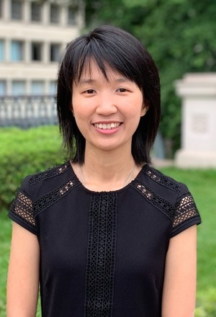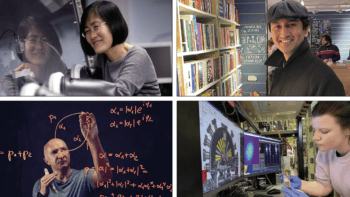City University of Hong Kong’s undergraduate physics programme wants to attract ambitious international students as they take their next step towards a scientific career in research or industry

Think big, recruit well, move fast: that’s the ambitious mantra informing the leading-edge research effort and undergraduate education programme within City University of Hong Kong’s Department of Physics. Although it only came into being in 2017, after the university chose to create distinct disciplinary specialisms from the former combined physics and materials science programme, the CityU Department of Physics demonstrates a unity of purpose and collective endeavour that suggest its ultimate goal – to create one of the leading academic centres for physics education and research in the Asia-Pacific region – is a realistic proposition over the medium term.
Progress has been swift – notwithstanding all the disruption and uncertainty caused by the COVID-19 pandemic over the past 18 months. In the latest Research Assessment Exercise, commissioned by the University Grants Council of Hong Kong, the CityU physics department fared well, with an independent international panel rating 38% of its research output as four-star (i.e. “world-leading”). Unsurprisingly, growth and recruitment are also hard-wired into the CityU physics roadmap, with significant scale-up planned across PhD, postdoc and junior faculty positions over the next five years – all of that underwritten by generous funding from CityU’s Global Scholar Recruitment Campaign to attract the brightest and best early-career physicists with a breadth of international experience.
The next generation
While that’s the research context, clearly the future of any academic physics endeavour lies in its undergraduate education programme – and CityU is no exception. “The BSc physics curriculum here provides a rigorous training in fundamental science and a solid foundation for students seeking a pathway to a long-term research career,” explains Wing Chi Yu, an assistant professor specializing in theoretical condensed matter physics and deputy leader of CityU’s undergraduate physics programme. Equally, for students intent on following an industry pathway, there’s a wide selection of elective course modules covering specialist applied topics such as financial engineering, medical physics, optics and photonics, and materials science.
Another notable feature of CityU’s BSc physics programme is the level of one-to-one support afforded to each undergraduate. “Every student has their own academic adviser to help them plan their career,” Yu explains. “In addition, they have a direct line into what we call a senior peer consultant, a student further along in the undergraduate programme.” The relative youth of CityU’s physics faculty is also significant, with around a third of the academic staff under 40 and many of them having gained experience at leading European and North American institutions. “CityU’s research and teaching culture ensures an open and collective conversation between lecturers and undergraduates,” adds Yu.
Top of the class
More broadly, the CityU Talents Programme provides an operational framework to enable outstanding undergraduate physics students to realize their full academic potential. The joint bachelor’s degree programme between CityU and Columbia University (New York) is a case in point, with successful applicants spending their third and fourth years at Columbia University to earn a BSc degree from CityU and a BA degree from Columbia.

“This is a highly competitive programme that typically enrols two or three elite-performing students annually from our second-year undergraduate cohort,” explains Yu. “It’s a fantastic opportunity,” she adds, “combining the academic rigour of two world-renowned universities with the social and cultural traditions that play such a big part in a student’s intellectual formation.”
Another CityU Talents initiative is the undergraduate plus taught postgraduate degree programme (BSc physics + MSc applied physics), which aims to nurture high-calibre undergraduate students through integrated learning, such that they can benefit from research elements normally taught exclusively at postgraduate level. Upon successful completion of the course requirements – typically over four or five years – students receive two separate degrees (BSc and MSc), positioning them on a fast-track to further study at PhD level.
For elite-level students more interested in the commercial exploitation of scientific discoveries and physics-based innovations, there’s the option of applying to study physics within the Global Research Enrichment and Technopreneurship (GREAT) initiative. The four-year GREAT degree comprises specialist courses on entrepreneurship, intellectual property rights, patent applications and high-impact research proposals and business plans. Students also benefit from at least one semester of overseas exchange (course modules and research) alongside opportunities for independent research commencing as early as year two of the degree programme.
The right connections
One of the defining features of CityU’s BSc physics programme is its emphasis on external connection and collaboration. Undergraduate students, for their part, are encouraged to enrich their learning experience through exchange studies (usually one or two semesters) at CityU’s partner institutions – among them the University of Illinois at Urbana-Champaign (US), University College London (UK) and National Taiwan University. “Upon completion of the relevant courses at the host university,” Yu explains, “students participating in all levels of the exchange programme can apply to transfer their earned course credits to their CityU BSc degree.”
Closer to home, CityU offers physics students further development opportunities through the Undergraduate Research Attachment Scheme, which allows young scientists to join a faculty member’s research team on a project basis to participate in day-to-day laboratory work. At the same time, students can access work-placement opportunities through a range of CityU internship schemes, providing full-time job attachments at companies in Hong Kong, the Pearl River Delta region and further afield. Similar research internships are available at the China Spallation Neutron Source in nearby Dongguan, while final-year research attachments are often provided via the medical physics departments of prominent Hong Kong hospitals.
Internally as well, there are opportunities for undergraduates to broaden their skill base. The PHY Student Ambassador Enrichment Programme, for example, aims to recruit passionate students to co-host the department’s learning support network. The priority is to provide mentoring and peer consultancy to first-year undergraduates as they adjust to life at CityU and make their elective course selections. “Furthermore, the PHY ambassador programme give students an opportunity to develop their leadership, presentation and interpersonal skills to support CityU physics outreach activities,” says Yu. “By working with other ambassadors, they become solid team players along the way – skills that will come in handy for their future job-hunting and academic interviews.”

CityU physics: investing in ‘rising stars’ to deliver sustained research excellence
Fundamentally, though, CityU physics is all about bringing together a diverse mix of undergraduate students, creating the conditions for their collective curiosity, energy and talent to flourish and forge a deeper understanding of how nature works. “The physics programme trains students’ logical thinking and problem-solving skills,” Yu concludes. “That training and scientific rigour will benefit our students over the long term, whether they stay in academic research or move on to a career in industry and business.”
Further information
To find out more about CityU’s undergraduate physics programme, register now for the CityU Virtual Information Day: Talents Beyond Boundary on Saturday 23rd October 2021. Details of CityU entrance scholarships and funding opportunities for international students can be found here.




